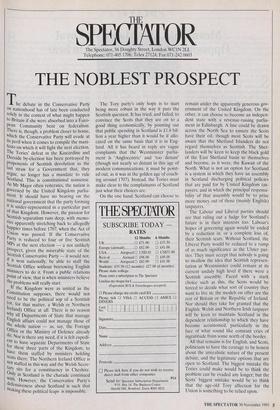THE
SPECTATOR
The Spectator, 56 Doughty Street, London WON 2LL Telephone: 071-405 1706; Telex 27124; Fax 071-242 0603
THE NOBLEST PROSPECT
The debate in the Conservative Party on nationhood has of late been conducted solely in the context of what might happen to Britain if she were absorbed into a Euro- Pean Community bent on federalism. There is, though, a problem closer to home, which the Conservative Party will evade at Its peril when it comes to compile the mani- festo on which it will fight the next election. The Tories' defeat in the Kincardine and beeside by-election has been portrayed by Proponents of Scottish devolution as the last straw for a Government that, they argue, no longer has a mandate to rule Scotland. This is constitutional nonsense. As Mr Major often reiterates, the nation is governed by the United Kingdom parlia- ment. It should have no bearing on the national government that the party forming It is under-represented in a particular part of that Kingdom. However, the passion for Scottish separatism runs deep, with memo- nes apparently stretching back to allegedly happier times before 1707, when the Act of union was passed. If the Conservative Party is reduced to four or five Scottish MPs at the next election — a not unlikely Prospect, given the miserable state of the Scottish Conservative Party — it would not, If it won nationally, be able to staff the Scottish Office without borrowing English Ministers to do it. From a public relations Point of view, that is when ministers believe the problems will really start. If the Kingdom were as united as the Constitution supposes, there would' not need to be the political sop of a Scottish (or, for that matter, a Welsh or Northern Ireland) Office at all. There is no reason why all Departments of State that manage ELI1glish affairs could not manage those of tue. whole nation — as, say, the Foreign Office or the Ministry of Defence already (10. Nor is there any need, if it is felt expedi- ent to have separate Departments of State for these three parts of the Kingdom, to have them staffed by ministers holding seats there. The Northern Ireland Office is not staffed in this way and the Welsh Secre- tary sits for a constituency in Cheshire. Only in Scotland is the charade continued With However, the Conservative Party's defensiveness about Scotland is such that making these political leaps is impossible.
The Tory party's only hope is to start being more robust in the way it puts the Scottish question. It has tried, and failed, to convince the Scots that they are on to a good thing economically, by pointing out that public spending in Scotland is £1 .8 bil- lion a year higher than it would be if allo- cated on the same basis that it is in Eng- land. All it has heard in reply are vague complaints that the Westminster parlia- ment is `Anglocentric' and `too distant' (though not nearly so distant in this age of modern communications, it must be point- ed out, as it was in the golden age of coach- ing around 1707). Instead, the Tories must make clear to the complainants of Scotland just what their choices are.
On the one hand, Scotland can choose to remain under the apparently generous gov- ernment of the United Kingdom. On the other, it can choose to become an indepen- dent state with a revenue-raising parlia- ment in Edinburgh. A line could be drawn across the North Sea to ensure the Scots have their oil, though most Scots will be aware that the Shetland Islanders do not regard themselves as Scottish. The Shet- landers will be keen to keep the black gold of the East Shetland basin to themselves and become, as it were, the Kuwait of the North. What is not an option for Scotland is a system in which they have an assembly in Scotland discharging political policies that are paid for by United Kingdom tax- payers, and in which the principal responsi- bility of that assembly would be to prise more money out of those (mainly English) taxpayers.
The Labour and Liberal parties should see that ruling out a fudge for Scotland's future is in their interests too. Labour's hopes of governing again would be ended by a reduction in, or a complete loss of, their Scottish seats. Without Scotland, the Liberal Party would be reduced to a rump of as much significance as the Ulster par- ties. They must accept that nobody is going to swallow the idea that Scottish represen- tation at Westminster could remain at its current unduly high level if there were a Scottish assembly. Faced with a stark choice such as this, the Scots would be forced to decide what sort of country they want to live in; the models on offer are the rest of Britain or the Republic of Ireland. Nor should they take for granted that the English, Welsh and Northern Irish taxpayer will be keen to maintain Scotland in the dependent relationship to which they have become accustomed, particularly in the face of what sound like constant cries of ingratitude from some north of the border.
All that remains is for English, and Scots, politicians to have the courage to be honest about the unrealistic nature of the present debate, and the legitimate options that are open to Scotland. The biggest mistake the Tories could make would be to think the problem can be evaded any longer; but the Scots' biggest mistake would be to think that the age-old Tory affection for the Union is something to be relied upon.










































































 Previous page
Previous page